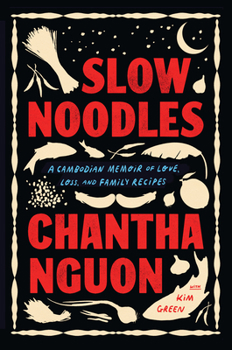
This book is a gem of a recipe book/memoir but more importantly, it’s a tale of survival, grit, and integrity. Chantha is from Cambodia. She was the child of a middle class family whose father owned an auto shop and whose mother was a housewife who was a hard worker and an excellent cook. Chantha lived a blessed life until she was nine. She was the youngest child and soft by her own admission. She attended Catholic school and spoke French. Her older sister also worked in the home and took care of the family alongside her mother.
Sadly, when Chantha was nine, horrible changes came to Cambodia with the rise of Pol Pot and the Khmer Rouge in the 1970s. Her whole life was turned upside down. For many years. Decades even.
She lost her father to a stomach ailment. The family fled to Saigon and lived there for a while. Some went right away and some delayed their trip for a while, until what was left of the family was reunited. Eventually, things fell apart in Saigon as they had in Cambodia. This area of the world was quite volatile in that decade and Chantha was caught in the middle of it. When Saigon became unsafe, the wandering years began for Chantha.
This memoir is heartbreaking in many ways but is also a tale of one woman’s resilience and how she found her way to success and a happy life. She made harrowing escapes from some situations and almost starved to death on many occasions. But through it all, she kept hope in her heart for the most part—She did have a few moments of despair, but soldiered on. She also made her own way on the world from the pampered young daughter who thought she had no skills to the tough woman who worked as a cook in a brothel, worked as a suture sewer in a refugee camp and worked other occupations to keep herself and her companion alive. She also studied English and worked for Doctors without Borders to help bring relief to the people around her.
In each chapter there are recipes she either recalled from her mother and sister or she created herself with the ingredients to hand in the hard times.
Also in the book she shows the reader the sense of humor she kept throughout her life in some “recipes” that are more like humorous comments about life and her experiences.
Overall, this book is sometimes hard to read due to the privations this lady endured, but it is ultimately a story of one woman’s ability to hold strong and make her way in the world when she was left all on her own by the vagaries of fate.
By the time the reader gets to the end, one can’t help but be proud of this lady and all she has accomplished in life. And the recipes are well worth the price of the book. This is truly a great read that makes the reader think about how much people can endure and still come out on the other side as a whole and fulfilled person.
BLURB:
Take a well-fed nine-year-old with a big family and a fancy education. Fold in 2 revolutions, 2 civil wars, and 1 wholesale extermination. Subtract a reliable source of food, life savings, and family members, until all are gone. Shave down childhood dreams for approximately two decades, until only subsistence remains. In Slow Noodles, Chantha Nguon recounts her life as a Cambodian refugee who loses everything and everyone–her home, her family, her country–all but the remembered tastes and aromas of her mother’s kitchen. She summons the quiet rhythms of 1960s Battambang, her provincial hometown, before the dictator Pol Pot tore her country apart and killed more than a million Cambodians, many of them ethnic Vietnamese like Nguon and her family. Then, as an immigrant in Saigon, Nguon loses her mother, brothers, and sister and eventually flees to a refugee camp in Thailand. For two decades in exile, she survives by cooking in a brothel, serving drinks in a nightclub, making and selling street food, becoming a suture nurse, and weaving silk. Nguon’s irrepressible spirit and determination come through in this lyrical memoir that includes more than twenty family recipes such as sour chicken-lime soup, green papaya pickles, and p t de foie, as well as Khmer curries, stir-fries, and handmade b nh canh noodles. Through it all, re-creating the dishes from her childhood becomes an act of resistance, of reclaiming her place in the world, of upholding the values the Khmer Rouge sought to destroy, and of honoring the memory of her beloved mother, whose “slow noodles” approach to healing and cooking prioritized time and care over expediency. Slow Noodles is an inspiring testament to the power of food to keep alive a refugee’s connection to her past and spark hope for a beautiful life.
Sounds interesting. I always get hungry when reading a book with tasty recipes.
Me too. These recipes were definitely hunger-worthy. Lol
>